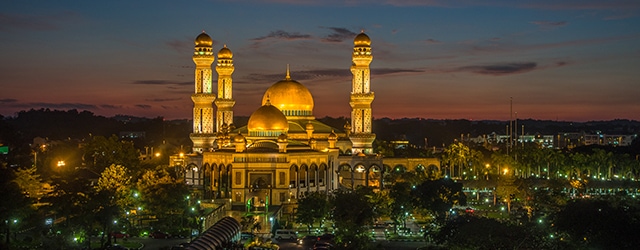Brunei, like other oil-rich nations, needs to diversify its revenue sources.

|
BRUNEI DARUSSALAM: VITAL STATISTICS |
|---|
|
Location: Southeast Asia |
|
Neighbors: Malaysia, Indonesia, South China Sea |
|
Capital city: Bandar Seri Begawan |
|
Population (2020): 436,962 |
|
Official language: Malay |
|
GDP per capita (2018): $31,628 |
|
GDP growth (2019): 3.9% |
|
Inflation (2019): -0.5% |
|
Currency: Brunei Dollar |
|
Investment promotion agency: Brunei Investment Agency |
|
Investment incentives available: 100% foreign ownership allowed; no sales and payroll taxes; company tax holiday possible |
|
Ease of Doing Business rank (2019): 66 |
|
Corruption Perceptions Index rank (2019): 35 |
|
Political risks: Politically stable |
|
Security risks: Violent crime is rare; some petty crime |
|
PROS |
|---|
|
Generally open to foreign direct investment |
|
Committed to promoting domestic business |
|
Political stability under Sultan Hassanal Bolkiah |
|
CONS |
|---|
|
Competing claims with other nations in the region on South China Sea resources |
|
Land code restricts noncitizens from freehold land ownership and also places restrictions on the sale and transfer of land by noncitizens |
|
Sources: Anadolu Agency, Government of Canada Global Travel Advisory, International Monetary Fund, Nikkei Asian Review, Pew Research Center, Reuters, Societe Generale, The Straits Times, Transparency International, US State Department, US Trade Representative, World Bank, Worldometer, World Population Review |
|
For more information, check out Global Finance‘s Brunei Darussalam Economic Report data page. |
It can be difficult to visualize tiny Brunei Darussalam—the name translates to Nation of Brunei, the Abode of Peace—a sultanate that occupies a small slice of the island of Borneo. “It’s very much off the radar,” says Michael Sek Pheng Yeo, senior research manager for IDC Financial Insights and Retail Insights in Asia-Pacific. On the other hand, “It is by no means like some unknown country.”
Brunei’s total land area is slightly larger than the state of Delaware, which may contribute to its low casualty rate thus far from Covid-19, Yeo suggests. At time of writing, Brunei had one virus-related death and 141 cases, with 134 individuals having recovered. Its population of about 437,000 makes setting up and enforcing restrictions relatively easy, says Yeo.
It helps, too, that Brunei is an affluent, energy-exporting country. As the third-largest oil producer in Asia and the fourth-largest exporter of liquefied natural gas, oil and gas account for over 50% of Brunei’s GDP and most of its exports, according to Société Générale.
Brunei’s oil wealth yields a higher annual per capita income at $31,628 than other larger oil-producing states, such as Saudi Arabia at $23,339. Although lower than Qatar’s $68,794, according to World Bank figures. Oil strength became a weakness this year, however; and Brunei’s revenues dropped drastically with the plunge in prices that was already underway before the pandemic. Brunei’s economic future now depends on the speed with which it can devise plans for diversification through the crisis and a potentially long slump in oil markets.
The country’s ambition to become a larger financial services center for the region already demanded a huge investment in human capital and financial resources, and a scaling up of small domestic banks, says Yeo. A major effort for a country without a stock market and with a powerful competitor in neighboring Malaysia.
The global pandemic makes economic forecasting a fool’s game. The economic slowdown that was underway for Asian nations will be exacerbated by reduced oil and gas consumption in major export destinations. In 2018, Japan and Thailand accounted for 35% and 10% of Brunei’s energy exports, respectively; while South Korea and Singapore accounted for 9% and 8%.
Tourism revenues are at risk, at least in the short and medium terms. Chinese travelers accounted for 22% of all tourists to Brunei in 2018, according to Fitch Solutions Group; and tourism flows are expected to remain weak even after the pandemic.
These factors will surely dampen outbound remittances, with negative consequences for the economies of remittance destinations. In 2017, Brunei workers sent out $782 million in remittances, including $457 million to Japan and $168 million to Thailand.



